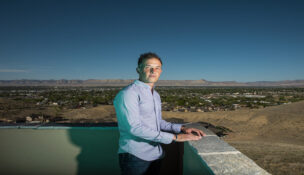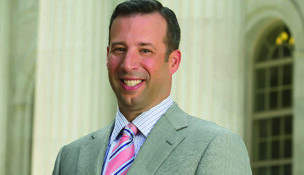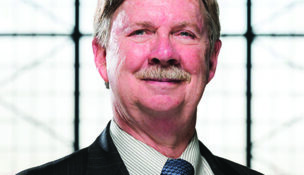Karen Gerwitz brings mile high perspective to international trade
As head of World Trade Center Denver, she hopes to expand Colorado's global reach
Gigi Sukin //July 6, 2016//
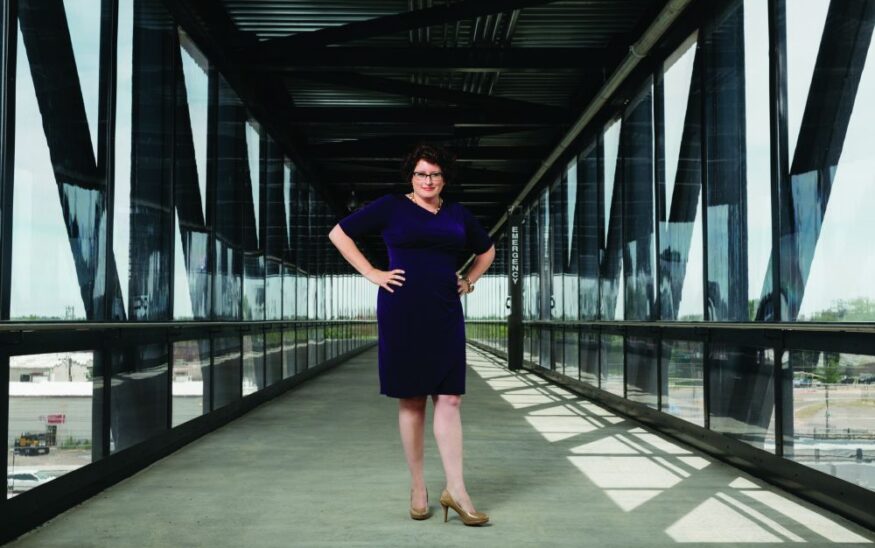

Karen Gerwitz brings mile high perspective to international trade
As head of World Trade Center Denver, she hopes to expand Colorado's global reach
Gigi Sukin //July 6, 2016//
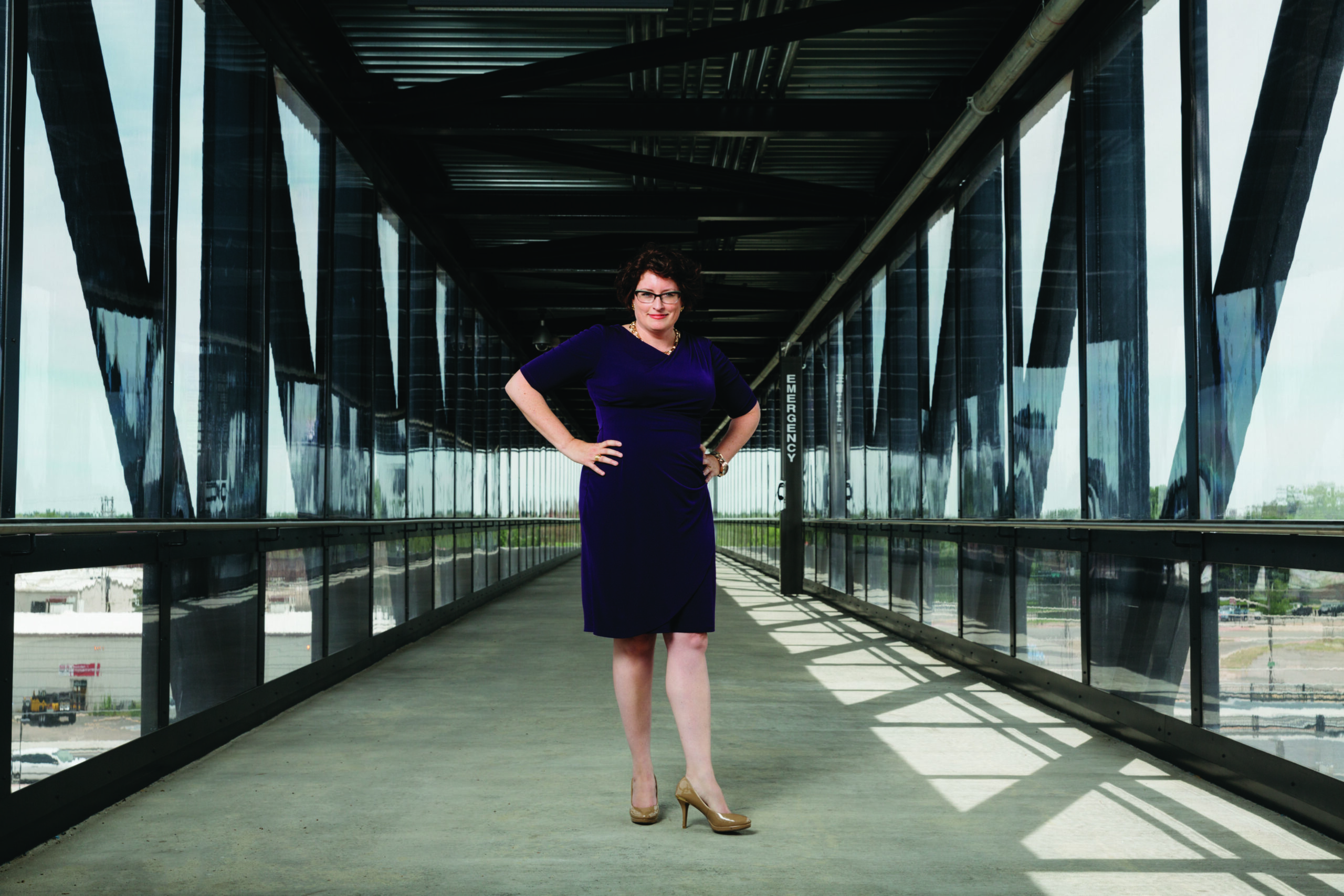
When you meet Karen Gerwitz at her office, it feels a little displaced. Temporarily housed inside the headquarters and manufacturing facility of Geotech Environmental Equipment in north Denver, the space strikes one as incongruous with the organization it houses – the World Trade Center Denver.
Gerwitz, president of the nonprofit, brings international experience from past roles that have included chief of protocol for the Colorado International Trade Office, to manager of communications for Aurora-based Raytheon. Her role with the World Trade Center and the prospect of a future-oriented campus in the River North neighborhood has the 48-year-old Gerwitz looking ahead to what she hopes will be Denver’s expanding presence on the global playing field.
What was your introduction to international business?
My only exposure to anything global growing up had been reading National Geographic. My parents were not big travelers. The summer before college, I worked in magazine subscriptions … and there was an AIESEC trainee there who I became friends with. It’s this [French] acronym that stands for the International Association of Students in Economic and Commercial Sciences. And then I got into AIESEC when I was in college. Actually, that’s how I met Jeff [Popiel, CEO of Geotech]. He was in AIESEC as well. We’ve known each other for a long time, which is another good reason why I’m here.
Any specific takeaways from that experience that apply to your work today?
In AIESEC … I’d go to companies all over Denver, asking them to hire a foreign student. It just so happens that those companies I was meeting when I was a student in 1986 are now – a lot of them, anyway – on my board. It’s a small, tight community. Ever since I’ve been a student, I’ve been trying to put Denver on the global map.
You spent five years at the state International Trade Office (now part of the Colorado Office of Economic Development), followed by a communications role at Raytheon, in Aurora. Did you ever work abroad?
A woman called me with a job offer in Vienna, Austria that started in two weeks. I said yes, and worked for a global science institute, selling media. It was a yearlong contract in 2001.
How long has World Trade Center Denver been around? How does it function?
It was actually Metro State University that bought our license from New York in 1987. In 1989 they transferred the license to this nonprofit that was forming, and so we became the World Trade Center Denver … [to] gather and convene the international business community. We train them; we do general programming – like classes and events and conferences and provide all kinds of trade services.
How has your office been able to offer support or open a company’s eyes to the possibilities of international business?
We’ve probably trained 30,000 people since we’ve been around. An example: Three guys who worked on a diary farm in Kersey, Colo., invented a medical device for dairy cows – basically a thermometer in the shape of a pill. The cow swallows it, and you know when she’s ovulating; you know when she’s sick. And from your handheld device you can tell where each cow is in terms of her temperature. So they were able to administer vitamins, as opposed to antibiotics, because if you give a cow antibiotics, you can’t sell her milk. So they came to me and said, ‘We have this really cool product, and we’re thinking it has an international market.’ So we put them through some classes; we helped them with the export documentation; and we helped answer some questions and introduce them to some clients overseas. Now 70 percent of their revenue comes from international markets. It happened over a couple years.
Are Colorado companies going global and where are there challenges and opportunities?
Where Colorado really surpasses others is in services – engineering, architecture, financial, legal firms, software firms and more.
Where I think we’re limited in the middle of the country is we think the domestic market is so large; why should I take on a riskier, unknown market? What I’ll tell you is 95 percent of the market potential is outside the U.S. That’s a lot of lost opportunities. Less than 5 percent of U.S. companies are exporting.
What’s a fair benchmark to say job well-done for your organization?
This is when it really started to sink in: I traveled to an international conference. Every year all 330 of us get together in a different place. The first year I went, in 2010 to Beijing, I had started a month earlier. Somebody from another World Trade Center said, ‘If you want to know how to run an educational program, look at Denver.’
And then of course, companies continue to send people to our classes to pursue their certificates. And most importantly, when I see them give me a job description for our job board, and it says ‘Preferred Certificate of International Trade Holder.’ That’s the kind of thing that shows we’re doing something that matters.
Describe WTC Denver’s plans for the future.
Metro State and other local leaders back [in 1987] were very engaged with what Denver was becoming. Back then we were talking about the new DIA; we were talking about connectivity; we were talking about transit, and about how Denver becomes a global city. And all those things have or are coming to fruition.
It’s actually what’s forming our decision to change the face of the World Trade Center.
Today there’s a new definition of trade. This is what’s defining our new campus. How is the next generation defining trade? They’re busting out of the shipping container. When you download an app that was made in India, you’re trading . We’re changing the way we offer programming and we’re changing the way we are as a community, which is absolutely why we need this campus.
Talk about the transformation to a campus.
The commuter rail was very important to us from DIA to downtown. There’s a lot of development going on. A lot of coworking spaces are going up – right across the street will be INDSUTRY 2.0; there’s Catalyst, that is focused on digital health. By the way, the number one thing we export [out of Colorado] are medical devices.
What we will focus on is how to globalize your business. Whether it’s importing, exporting, setting up global operations, that’s what we’ve always specialized in.
The World Trade Center campus will be just as you come off the train at 30th and Blake streets. We’re going to break ground in 2017. We’ll enter into a license agreement with the developers and we should be open by 2019.
It’s a few acres, and what we’re planning on putting there is a business-friendly hotel, corporate offices, a coworking space, a conference center, and global-themed restaurants and retail. Just adjacent to us are two housing developments . We think it could be a very unique ecosystem in Colorado where it is uniquely global in nature, as well as the services we provide, the diversity of tenants, and it could be an attraction point for global business visitors to stop in and get support. But it’ll have the Denver fairy dust on top. It doesn’t have to be a huge tower to be successful.
Our ecosystem is going to consist of the startup that might be born global, their product is designed to go global, or is a service that makes sense for e-commerce, all the way to the multinational that wants a commercial international division in this campus. Some of the aerospace companies that are in Colorado have a hard time getting international visitors through their lobbies. They have compliance restrictions, which we actually teach. So what if we were able to create a commercial space for them to showcase, or an office for NREL, so they can come and meet international visitors in a convenient spot? We want those mutually beneficial collisions to happen.
You’ve lived in Colorado since you were 8. What makes Denver worthy of showcasing to the international business community?
I’ve been selling Colorado, Boulder and Denver to the international community since before college. I’ve wanted Denver, Boulder, Colorado to be significantly placed on the global map my whole life.







